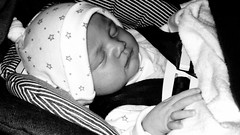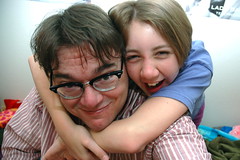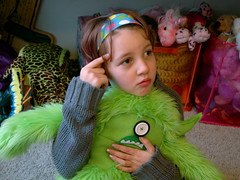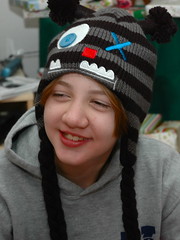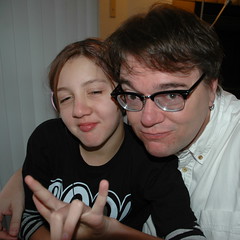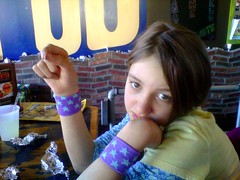I've talked about this before.
If you want to know my feelings about kids with disabilities and standardized testing, follow that link and read what I wrote two years ago. I don't think my outlook has changed on this at all; indeed, they didn't change even after Schuyler passed part of the test.
It's a cliche, perhaps, but this week, I feel like my child is being left behind. At least she won't have a lot of homework. More time for self-esteem repair, I suppose. Since everyone involved in education is bitching about NCLB this time of year, I'll leave it at that.
I've sort of come to dread the spring as far as Schuyler's school experience is concerned. It's a one-two punch of TAKS testing (and all its accompanying anxiety) and the following meeting to discuss Schuyler's IEP for the following year. Last year, the school district's educational diagnostician asked for (and was denied) our permission to administer a new cognition measurement test (basically, an IQ test) to Schuyler. She even admitted, without hesitation, that she believed such a test would reveal Schuyler to fall within the range associated with mental retardation (or whatever she calls it now, post-Rosa's Law).
That wasn't a good IEP.
I wrote about this last year, in a post titled "Truth can be a monster, too", and looking back on it now, I think it was probably one of the more important things I've written publicly about Schuyler's academic situation. It certainly paints a more accurate picture than what I wrote in my book as I tried to look into her future.
At that time, I was talking about Schuyler being mainstreamed at an age-appropriate level and one day joining her typical classmates and graduating from high school with them. But all of that was a lie, albeit an unintentional one. Schuyler's inclusion was something of a Potemkin village, and we happily allowed ourselves to buy into the fiction for far too long. We believed what we wanted to believe, to our utter shame.
"Truth can be a monster, too" ended like this, with some of the hardest words I think I ever had to write, hardest of all because they might have been loaded with frustration and sadness, but they were fat with truth, too:
For all my fancy book events and all my inspirational speeches and all my "gee, what a dad!" accolades, in the end I might be just like any other parent of a disabled child who has convinced themselves that the future is going to be easier, not harder, than the past and the present. I've looked at families with kids who sit solidly within that MR diagnosis and I've counted myself fortunate that my daughter has future options unavailable to them, but that might not really be true after all. It's entirely possible that I've stupidly and arrogantly pitied my own people.
My love for Schuyler has made me a believer and an unwavering advocate, but it might also be making me into a fool. And that's hard to face.
So how do I feel? I'm tired. It's exhausting, trying to build a fantasy world in which you child's disability isn't going to hold her back forever. It's a full-time job, convincing myself that everything's going to work out somehow and that one day she'll tell people "Why, there was a time when my teachers thought I was retarded, and look at me now! My parents believed in me, and they were right. I'd like to dedicate this Pulitzer to them."
And it requires a constant, unblinking effort to convince myself of the very very pretty lie that my little girl is going to be okay.
A year later, I'm not sure how much has changed. I never made peace with the idea that Schuyler might be MR, and in fact I believe more than ever that she is not. Am I overbelieving in her, as I also expressed last spring? Perhaps, but I still think that as her father and one of her two chief advocates, overbelieving in Schuyler is exactly appropriate. Furthermore, and this is where there is perhaps the potential for disagreement amongst the members of the IEP team, I believe that overbelieving is right and appropriate for every single teacher and therapist who works with her. Every single one of them. Period.
I've already met with someone who will, I hope, be key to some success for Schuyler. A couple of weeks ago, I picked her up from school and took her to meet the band director at her new middle school, and after evaluating Schuyler's abilities on a few different possible choices, it was decided that percussion will be the best choice. Schuyler the drummer girl. Just imagine it.
I like this band director; I'm hopeful that she will operate in a spot somewhere between the two extremes of "I have contest coming up, I don't have time to coddle a special ed student" (there's some of that out there, I'm sorry to say) on one hand, and on the other, a brand of "inclusion" that involves parking the kid with the disability in the corner with a chair and a rubber triangle. I think this director is going to be demanding of Schuyler and is going to help her learn how to focus. I think she's going to give Schuyler a chance. She might even overbelieve just a little.
At this year's IEP, we'll be changing Schuyler's team dramatically. This will be her last IEP meeting at the school that has, for all our recent disagreement, taken better care of Schuyler than most broken children ever experience. But after last year's attempt to stamp Schuyler as MR by the diagnostician, with the tacit agreement of other members of the team, there has been a serious divergence between the school's philosophy for Schuyler and ours.
Will that continue with next year's team? Or can we assemble a team of overbelievers, a group that will be less interested in trying to determine what Schuyler is incapable of doing and instead try to determine what she already knows and how to build from there?
I live in hope. As Shakespeare says, all men, I hope, live so.
At this year's IEP, we'll be changing Schuyler's team dramatically. This will be her last IEP meeting at the school that has, for all our recent disagreement, taken better care of Schuyler than most broken children ever experience. But after last year's attempt to stamp Schuyler as MR by the diagnostician, with the tacit agreement of other members of the team, there has been a serious divergence between the school's philosophy for Schuyler and ours.
Will that continue with next year's team? Or can we assemble a team of overbelievers, a group that will be less interested in trying to determine what Schuyler is incapable of doing and instead try to determine what she already knows and how to build from there?
I live in hope. As Shakespeare says, all men, I hope, live so.




